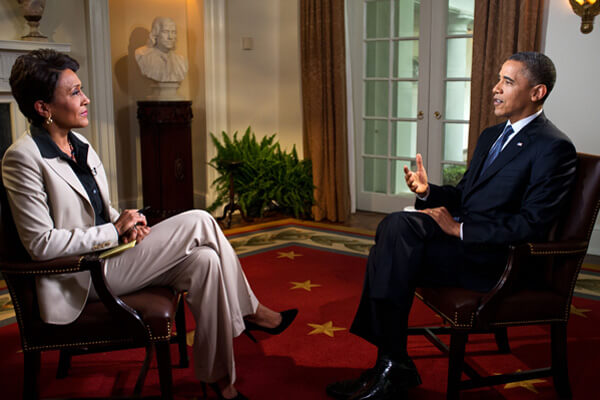President Barack Obama declares victory at Chicago's McCormick Place shortly after midnight on November 7. | CHIP SOMODEVILLA/ GETTY IMAGES
Four years ago, Barack Obama, a first-term US senator from Illinois, was the candidate of “hope and change.” In his young administration, handed an economy that was bleeding hundreds of thousands of jobs each month, change came haltingly and on some issues not at all. The word hope became a cudgel with which his fiercest opponents mockingly beat him about the head — and a stale word for many other voters, a good number of them young, first-time election participants, who were disappointed and even cynical about what they viewed as squandered promise.
In his reelection victory speech, the president addressed the issue of raised expectations.
“I have never been more hopeful about America,” he said during the speech’s impassioned conclusion. “And I ask you to sustain that hope. I'm not talking about blind optimism, the kind of hope that just ignores the enormity of the tasks ahead or the roadblocks that stand in our path. I'm not talking about the wishful idealism that allows us to just sit on the sidelines or shirk from a fight. I have always believed that hope is that stubborn thing inside us that insists, despite all the evidence to the contrary, that something better awaits us so long as we have the courage to keep reaching, to keep working, to keep fighting.”
Obama’s reelection and other good news that came out of Tuesday’s voting — particularly our success on four marriage equality ballot questions and in electing the first out lesbian to the US Senate — offer a sound basis for renewed hope. We can all move beyond November 6 fortified in our “courage to keep reaching, to keep working, to keep fighting.”
Elsewhere in this issue, Doug Ireland writes about the burning urgency of the LGBT community recommitting to a progressive politics of coalition and grassroots organizing. I could not agree more — and our ability to build majorities in favor of marriage equality in four states demonstrates the payoff in moving beyond our comfortable cultural silos to engage the larger and more diverse body politic.
African-American and Latino voters were the firewall that guaranteed the president’s reelection — and, thereby, the opportunity for our community to continue to advance our goals. Since the Proposition 8 disappointment of 2008, LGBT Americans have learned the importance of dialogue with people of color communities on issues we care about. Our coming together with Latino leadership on common concerns over immigration and with the NAACP on issues from marriage equality to stop and frisk policing demonstrates the progress that is possible.
I disagree with Ireland, however, in his assessment of Obama’s leadership. I don’t believe his first term was “spineless.” His success on healthcare reform delivered on a Democratic Party promise first articulated by Harry Truman more than 60 years ago. Ending Don’t Ask, Don’t Tell, the president also made imaginative use of executive authority to spur change not possible by working with either a Tea Party-intimidated GOP House leadership or, prior to 2011, with a filibuster-emboldened Senate Republican minority. And, however reluctantly Obama made his dramatic endorsement of marriage equality in May, the fact is that it was an astonishingly powerful moment in the relationship between our community and the wider American public.
None of that is to say that I doubt for one moment Ireland’s central point — that we will only continue to advance by intensifying the pressure on our friends, whether in the White House, the administration generally, Congress, or at the state and local government level.
Washington remains politically divided and GOP leaders in Washington likely still fear the wrath and reaction of their Tea Party faction. But flirting with that element in their party is, more clearly than ever, a dead end politically. Right-wing extremists have led Republicans to forsake four easy Senate pick-ups in 2010 and 2012 — this year thanks to two white men hideously out of touch with the rights of women to make their own medical decisions with dignity.
The four marriage ballot questions, meanwhile, show how quickly gay rights have moved from a GOP wedge advantage to an albatross for that party.
After four years in which Republicans obstructed, obstructed, and obstructed in the dream of making Obama a one-term president, he now has the capital to demand that they get serious about governance and compromise. Given that three-quarters of our community voted to reelect the president and that we have been substantial contributors to his campaign coffers, we have the right — in fact, the responsibility — to demand we be part of the Democratic push to bring the GOP to heel.
We need to be measured, of course, in our expectations about House Speaker John Boehner — who has, to date, squandered $1.5 million in public monies to defend the 1996 Defense of Marriage Act in court. But his view of the world and of the culture Americans inhabit is on the run, and it is time for us to push back hard. Discrimination is harder and harder for anyone to justify in America, and if the GOP continues to block even our most basic demands — such as protection from discrimination in the workplace — we need to make it our business to force them to explain that over and over and over again.































